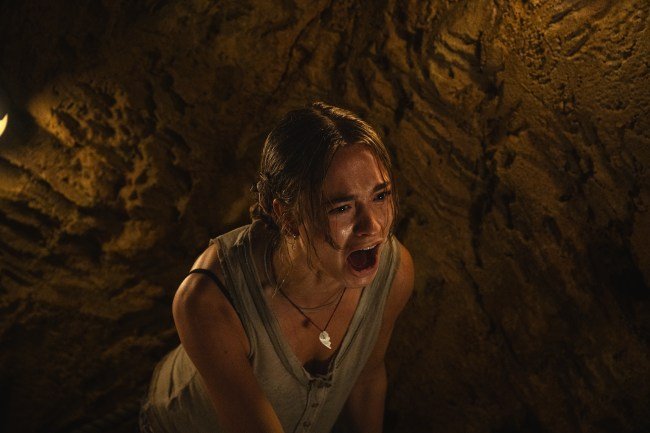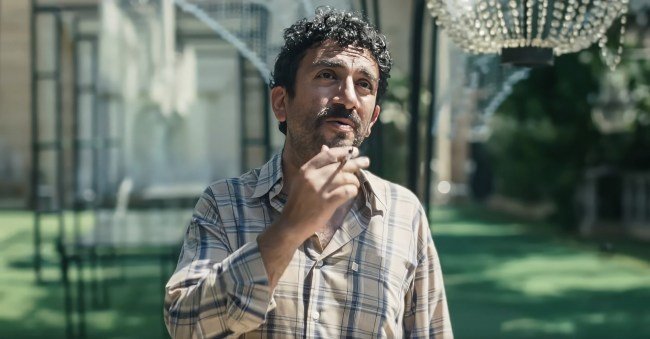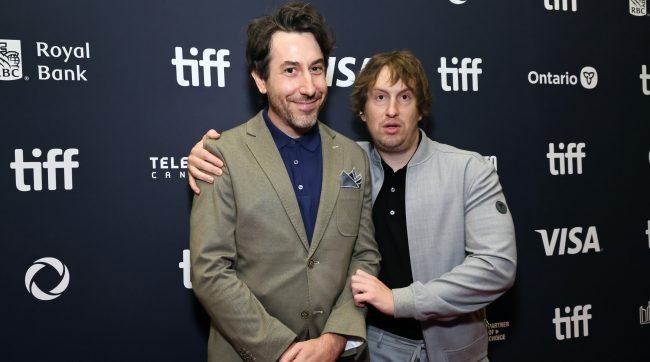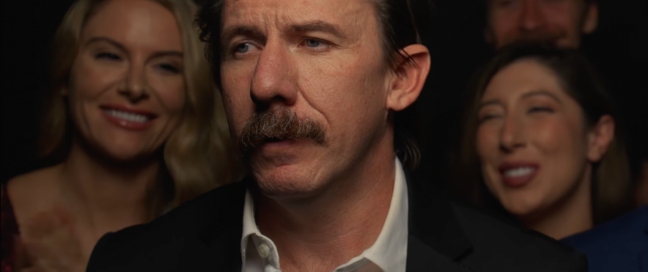Russell Tovey on ‘Plainclothes,’ ‘Looking,’ and Sex Scenes
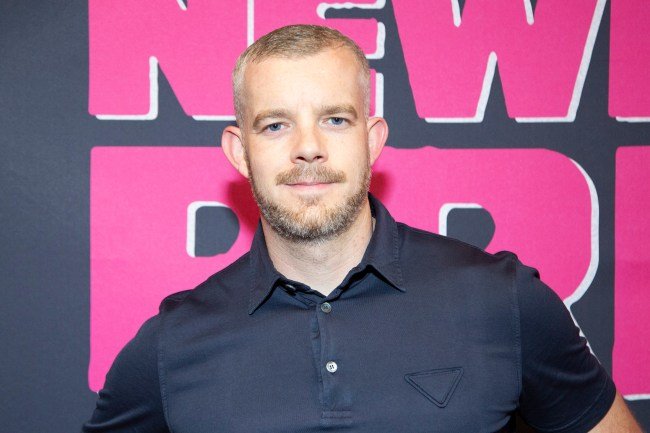
Russell Tovey, the gay British actor who’s been out of the closet since he was a teenager, has played characters both repressed (see: Mormon closet-case Joe Pitt onstage in “Angels in America”) and proudly queer (HBO’s “Looking”).
In his latest “Plainclothes,” the Sundance winner written and directed by first-feature filmmaker Carmen Emmi, he plays a closeted family man who sparks an affair with an undercover cop, played by Tom Blyth. In the 1997-set drama, Lucas (Blyth) is a police officer tasked with baiting men for a bathroom stall hookup in one of those depressing Malls of America, only to arrest them, caught not in the act but just before it. Lucas, though, is secretly gay, and his encounter with Andrew (Tovey) sends his world ricketing off its hinges.
In this New Queer Cinema-inspired drama that doubles as a coming-out story and a romance — Lucas is feeling a new flush of things for Andrew that might not be totally reciprocated — Tovey gives a marvelously restrained performance as a closeted man who may have plenty of furtive gay experience already, but he has more in the way of secrets.
Tovey, though, is perhaps best known for his role as video-game entrepreneur Kevin in creator Michael Lannan’s HBO series “Looking,” which ran for two seasons between 2014 and 2015 and was followed by a TV movie directed by Andrew Haigh. The “All of Us Strangers” filmmaker also executive-produced the groundbreaking Bay Area-set show about gay best friends and their ordinary lives, and directed many episodes.
Fans of Tovey and co-star Jonathan Groff, who played Kevin’s eventual boyfriend and the series’ lead, have called upon HBO for a revival. Tovey would do it in a second, and in his interview with IndieWire at the Magnolia Pictures offices in New York City ahead of the “Plainclothes” release, he unpacked the younger generational appeal of the series, and spoke about his own experiences with repression that led to his latest role.
This interview has been condensed and edited for length.
IndieWire: You’ve played gay characters who are, for the most part, out of the closet in recent years. What drew you back into playing someone so repressed?
Russell Tovey: Normally, I can tell if I want to do something by the first few lines of dialogue, and I loved his dialogue, and then meeting Carmen was just very exciting, because he’s like a little Labrador puppy. He’s very keen and bouncy and enthusiastic and complimentary to me, which is obviously affirming. Yes, he affirmed, he validated my ego. And I thought, “Well, that’s lovely. I want to do this.” And then I met Tom, and Tom’s brilliant. So that felt like, to play this together would be a real privilege, and I wanted to go to Syracuse, weirdly. I dated someone years ago who was from Syracuse, and in my head, it had this romantic sort of like I was like, this, Syracuse sounds so kind of mystical and magical. I mean, there’s parts of it that are, but the majority of it is pretty run-of-the-mill.
What was your experience there like?
I went to a movie theater one day because I had a day off, and I felt an aggression in there that I wasn’t prepared for. There was some guy who bumped into me, and whispered in my ear, “You’ve got a tiny dick, dude.” I remember going, “Wow.” And I thought, well I’m not going to turn around and say, “Sorry, what did you just say?” I sort of laughed at myself because I found it very funny, and I called my friend up and I said, ‘Guess what’s just happened?’ But it was intimidating, and it was wanting or provoking a response to instigate violence. It jarred me for sure. That sort of energy then informed the rest of my experience in that mall. He wanted to fight, and I knew that.
This idea of a plainclothes cop luring and busting gay guys is most famous in the U.S. because of George Michael, which happened in the year this movie takes place. Was there a parallel of this phenomenon in the U.K.? Anti-gay Section 28 laws were still in effect when you came out, so there was still clandestine behavior like that being surveilled
We also still feel inherent trauma as a community from fucking Oscar Wilde, from sodomy laws, from illegalities, from being pushed further into the margins and doing dangerous things because it’s not a safe world, there’d never been a safe space that was created from us. I came out at a time that Andrew Haigh refers to as the “middle generation,” where we can be treated for HIV, but we’re coming out at an age where you’re working out liking people of the same gender, but with disease and risk. That’s a terrifying notion when you’re 13, 14, 15, that you have to think about that for many years, and it’s still the same thing where sex and death were very much in the same thought when you went to bed with someone. Then afterwards, the insecurities and the paranoia about illness were playing out constantly. I’m going to be 44 soon. It can take a long time to shake those things off.
You’re not aware when you’re in school that this law (Section 28) has been put in place because you’re a kid and you’re not really watching the news. You’re unaware that your education has been determined, and your opportunity for an authentic life or another option has been denied. All those feelings of shame, all those feelings of inherent denial of your sense of self, they all exist within (my character) Andrew. They all exist within Joe Pitt in “Angels in America.” They all exist within many characters I play, so that is something I can access. Artists can use our own shit to cherry-pick from and build characters, and in some ways exorcise these things that linger.

The scene in which Andrew and Lucas finally do have sex explicitly shows a condom being unwrapped, almost like it’s held up to the camera. Was that in the script, or your idea?
I can’t remember if it was or wasn’t, but I wanted safe sex to be in there. That was very important. We see a lot of sex scenes. There’s lube and everything but — I love the paraphernalia of that because it is clumsy and it slows things down, and maybe when you’re coming to writing a film or playing a scene, it breaks up the rush of “I need your body right now.” The realities of it shows the realities of Andrew, who is very much like, “This is what we do. This is how we do it. We’re going to do it my way.” What’s beautiful about this is you’ve got two characters, and there is a power dynamic. Andrew’s older, more experienced, the one who seems to be aware, he sets the location, he’s the one who says, “I can’t right now.” When you see him in the greenhouse, and he finds out Lucas’ job, the power dynamic shifts in an instant. I love that this film can take that tone in such an innocent tone, where suddenly he’s the one that’s vulnerable, being splayed open, and this younger guy who’s got no experience has suddenly got the power over him. Andrew has never been challenged before.
It was really important to me that we see condoms being used because it’s that period in history. Andrew could have been horrific to him, and it would’ve been a completely different movie, but it’s two guys who fall in love. You (wonder), “Why are they not together then?” They can’t be because they’re on such different spectrums. Andrew can see in Lucas an opportunity of freedom and authentic life. (Andrew) gives (Lucas) permission to do that, even though he can never give that gift to himself.
You obviously didn’t have an intimacy coordinator on “Looking” during the mid-aughts. Do you feel a difference now?
My relationship with Jonathan Groff was heaven. We absolutely adored each other. We felt so safe. We were looked after. At no point did I feel unsafe or uncomfortable, and I don’t think anybody did. That show was full of love, and we would all love to come back and do it. Even Andrew Haigh has said that.
“Looking” served a similar function for gay millennials that “Girls” did for women and straight ones — well, also gay ones too! “Girls” was recently rediscovered by Gen Z. Are you hoping the same for “Looking,” or have you already observed that?
A whole new generation has found it. It’s all over TikTok. I love the fact that people are outraged that there’s only two seasons and a movie, and they want more. I get asked weekly, “Do more ‘Looking.’” If you can talk to someone, I’d absolutely do more “Looking.” It’s one of the only shows I’ve done where I watch it as a fan.
What can Gen Z identify with in “Looking”?
It’s showing queer people hanging out, being mates, and the mundanities of what it is. They’re not extraordinary people. They’re very average people who have jobs, and they live for weekends, and they’re not super rich. I think it’s very aspirational of just peace, or just being, existing, and not needing more. There’s not really much phone stuff. There’s no social media really in that show. It’s like a pause, a moment of just peace, and I hope people will watch that and feel (they’re) finding some contentment in having good friends, someone to talk to, and be gay, be queer. That’s the goal: You’ve made it. That’s success.
“Plainclothes” is now in theaters from Magnolia Pictures.



